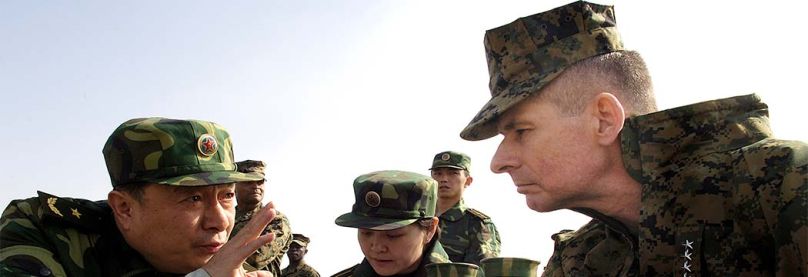
Andrew Sheng, Distinguished Fellow of Asia Global Institute, discusses Steve Bannon's view that a rising China means the unraveling of the liberal world order with the US at its helm.
The break between US President Donald Trump and his former adviser, Steve Bannon, over revelations in a new book prove that Trump felt Bannon was a loose cannon. Having crafted Trump's inaugural address on the need for "America first," Bannon certainly did overturn much conventional thinking in US foreign policy.
Bannon's latest speech to a Japanese audience, in which he tried to nudge Japan to rearm against Chinese hegemony, reflects his world view. Interestingly, he credits the Chinese "Belt and Road Initiative" as having successfully integrated the Mackinder-Mahan-Spykman theses of how to dominate the world. Sir Halford Mackinder was an influential British geographer/historian who argued in 1904 that "Whoever rules the Heartland (central Asia) commands the World-Island (Eurasia); whoever rules the World-Island commands the World". His American contemporary, Alfred Mahan was a naval historian who shaped the US strategy to dominate sea power, extending the British maritime empire logic of controlling the sea lanes, choke points and canals by policing global trade.
In contrast, Nicholas John Spykman argued that the Rimland (the coastal lands encircling Asia) is more important that the Heartland, thus: "Who controls the Rimland rules EuroAsia; who rules EuroAsia controls the destinies of the world."
By quoting that America spent US$5.7 trillion on the Iraq and Afghanistan wars since 9/11, with little results and more costs to come, Bannon called US efforts in the Middle East a no-win quagmire. One could also argue that the Obama/Clinton pivot to the Pacific was a strategic mistake, because however strong the US is militarily, no single country could afford to fight on the fronts of the Atlantic, Middle East and Pacific at the same time.
And now, by shifting its embassy to Jerusalem, the US administration has crossed an important red line in moving away from a "neutral" arbitrator's role in the Middle East to taking sides in ideological and religious divides there. But neither Israel nor its allies can deny that, in terms of population, Israel will be marginalized by the end of the 21st century, when its neighbours will have larger populations.
At the end of the first world war, Western thinkers tried to think through what caused the ideological struggle that led to massive, senseless carnage. Polish-American philosopher Albert Korzybski was a former intelligence officer in the Russian army who became famous for his insight: "the map is not the territory." The fault lay in language, because different nations cannot communicate accurately, thanks to assumptions about each other's positions, and thus cannot cooperate and prevent senseless conflict.
Applying Koryzbski's approach to Bannon's worldview, it becomes clearer that the United States is currently deeply split between two views - one isolationist view aimed at self-rejuvenation and the other seeking to maintain its liberal democratic leadership of the world. The differences in ideology rest on different assumptions about the world.
Worse, because the world consists of different languages, cultures and religions, it is not surprising that their perspectives and priorities are very different from the great powers. The farmers in Sub-Saharan Africa and the Middle East who face drought, failing crops and corrupt governments, will think of nothing except that northward migration to cooler climates in Europe will solve hunger for their families. North Korea's Kim Jong-un thinks that having nuclear arms and missiles gives him more bargaining power than strengthening his economy.
Military and economic power alone cannot solve our interconnected, interdependent global ills. With greater social media, the world has moved beyond simplistic 20th-century worldviews. As the unipolar world declines, we need more multilateral cooperation to solve global issues of climate change, conflict, disease and systemic failures.
Bannon shows remarkable clarity in understanding that China's rejuvenation represents a serious threat to US global leadership. He understands the unsustainability of the old financial capitalism paradigm, in which elites use the rules at the expense of the masses. But his solution to "deconstruct the administrative state" challenges both left and right, since both have bureaucracies subject to corruption, capture and ineffective delivery of social goals.
The old rules-based system cannot work in a world where the rules are changing profoundly through technology, climate change, demography and concentration of power at corporate levels that are larger and more powerful than nations. If there is no inclusive language and action to ensure that the key mental maps are on the same page, there is a serious risk that a Thucydides trap looms in the not-too-distant future. Without Bannon there to advise on the grand strategy, creating the common language and framework for dialogue between the great powers will be that much more complicated.
The views expressed in the reports featured are the author's own and do not necessarily reflect Asia Global Institute's editorial policy.

Distinguished Fellow, Asia Global Institute
Room 326-348, Main Building
The University of Hong Kong
Pokfulam, Hong Kong